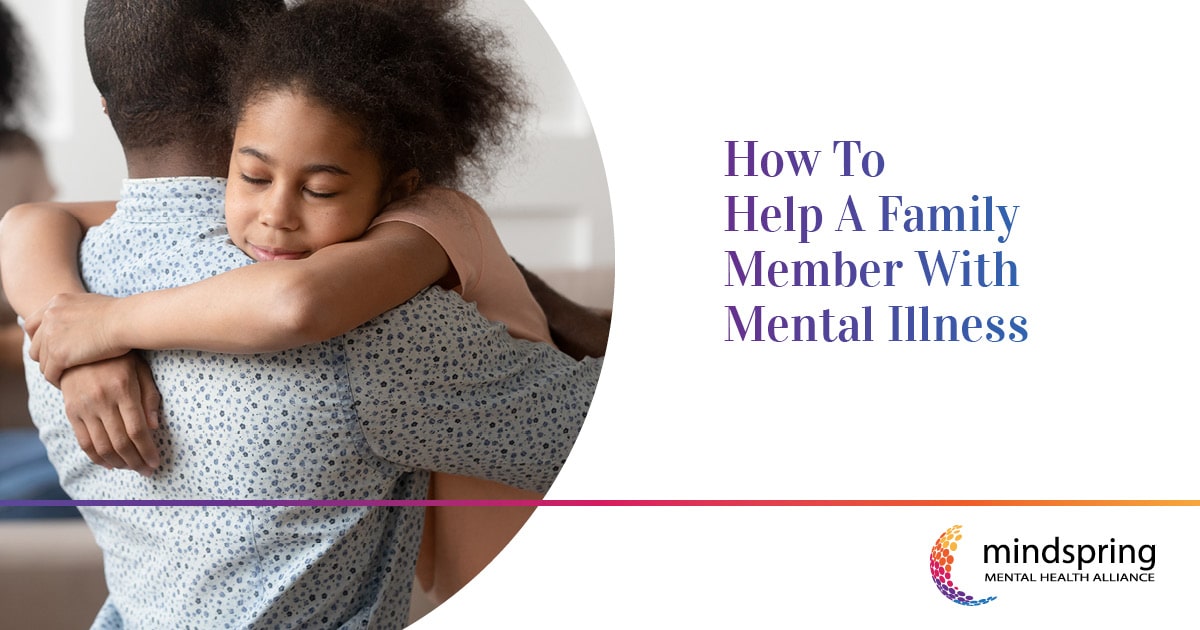
How To Help A Family Member With Mental Illness
May 13, 2022
Each year, one in five Americans experiences mental illness, according to the CDC, meaning mental illnesses are some of the most common conditions plaguing children and adults alike. Despite such a startling statistic, the stigma surrounding mental illness prevents many impacted individuals from seeking help. And it isn’t just those experiencing symptoms who are left grasping at straws.
The National Alliance for Caregiving reports at least 8.4 million Americans are caregivers to an adult with mental illness, spending an average of 32 hours each week supporting their loved one. Family members fighting to keep up with the ongoing challenges of their loved one’s mental health often aren’t aware of where to turn to receive help, and many forget to take care of themselves along the way.
At Mindspring, we recognize the lasting implications of mental illness and work to provide education, resources and support for all who are impacted, including family members navigating mental illness with one of their own. No one is in this alone, and there are places you can turn to in your community to learn how to provide the care your loved one needs while taking care of yourself.
Family Support For Mental Illness
The National Alliance for Caregiving reveals those supporting a mentally ill adult son or daughter are the most common type of mental health caregiver, and these caregivers are often living with and financially responsible for their family member with mental illness. The majority of these caregivers don’t have a backup plan if they find themselves in a position to no longer support their loved one, and oftentimes they don’t have another family member to turn to for help. This has a devastating impact on their own wellness: nearly two-thirds of these caregivers felt they didn’t have time to care for themselves and reported their own health worsening as a result.
Two other challenges facing caregivers today are navigating the mental health care landscape and learning how to appropriately address the needs of their loved ones. Thankfully, learning how to help a family member with mental illness doesn’t have to fall entirely on your shoulders. Knowing what resources are available to help alleviate your uncertainty and concern for your family member is a great way to ensure you and your loved one have everything you need to thrive.
How to get help with a mentally ill family member
At Mindspring, we are guided by the three pillars of our mission surrounding mental illness: education, advocacy and support. Whether working with you and your family to find the help you need or simply lending a listening ear, we aim to empower you and your loved ones through a variety of resources.
Every Tuesday through Thursday, over the lunch hour, we host free webinars for the public focusing on actionable tips and insights into mental illness. Tune in for a better understanding of your loved one’s experience with their mental illness as well as crisis coping skills to navigate emergency situations.
On the third Sunday of each month, caregivers and other family members come together in Des Moines for the Mindspring Family Support Group for those who have a loved one living with mental illness. This is a time to be the support others need through shared experiences and empathy for those in similar circumstances. All are welcome.
For more guidance, the National Alliance on Mental Illness partnered with the National Alliance for Caregiving to create the “Circle of Care: A Guidebook for Mental Health Caregivers.” This guidebook is rich with resources, including tips for finding the right provider, communicating with health care professionals, getting an accurate diagnosis, navigating health insurance and taking care of yourself.
How to help my child with mental illness
Twenty percent of children are either currently dealing with a debilitating mental illness or have had one at some point during their life, according to the CDC. Parents of young children in the throes of mental illness are thrust into tumultuous times but don’t have to do it alone—there are resources for parents supporting young children with special mental health needs as well.
The Child Mind Institute provides a variety of parenting guides for common mental health conditions impacting children, including anxiety, depression and mood disorders and eating disorders. The institute also offers advice to assist in aiding children who have experienced trauma or grief.
The National Alliance on Mental Illness shares how to talk to your child about mental health, get them the support they need at school and potentially beyond if mental health treatment is the best way to help your child with mental illness.
To learn more or receive free support from trained peers, parents can try the NAMI HelpLine at 1-800-950-NAMI.
Contact Mindspring For More Info About How To Help A Family Member With Mental Illness in Iowa
The resources we have shared by no means make up an exhaustive list. Family support for mental illness is so important to the impacted individual’s journey, but that doesn’t mean you should lose yourself along the way. Browse the resources available to you as a starting point, and always feel free to contact Mindspring online, call our office at 515-277-0672 or send an email to kkerner@mindspringhealth.org to let us know how we can help you and your loved one move forward with the appropriate support and resources in your own community.
Back